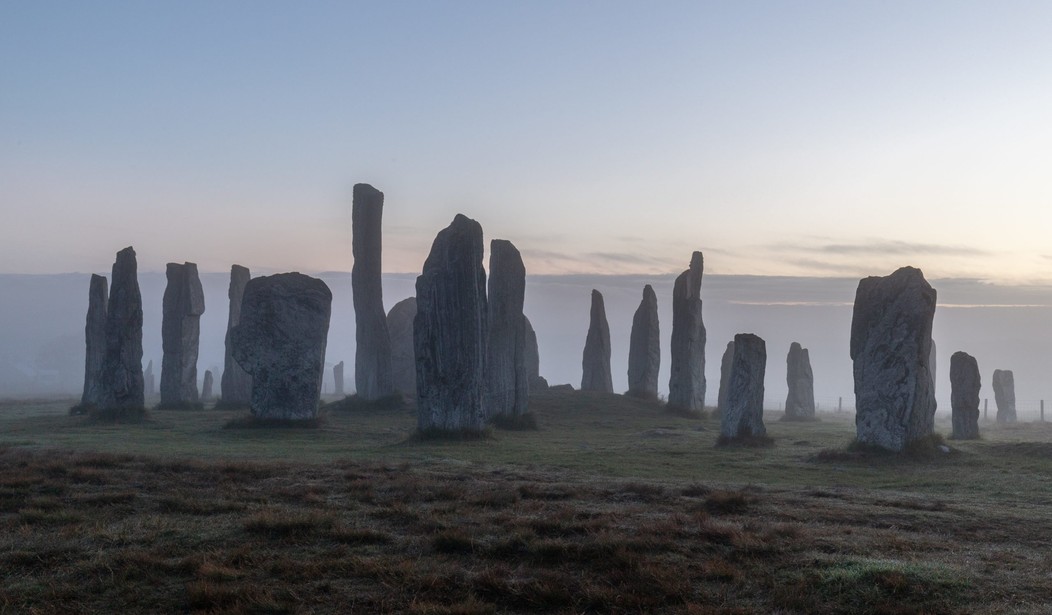One of the biggest mysteries in history is the late Bronze Age Collapse. There’s no good explanation for why an early globalized civilization should suddenly disappear at around 1177 BC. “Within a period of forty to fifty years at the end of the thirteenth and the beginning of the twelfth century almost every significant city in the eastern Mediterranean world was destroyed, many of them never to be occupied again.”
Modern archaeologists have advanced a number of theories to explain this catastrophe, several of which will sound familiar to modern ears. Climate change — not the anthropogenic kind, since “fossil fuels” had not yet been developed — might have caused drought and starvation. A technological revolution caused by the replacement of bronze with iron could have destabilized the international system. Perhaps the most modern-sounding of all explanations is “complexity.” The interdependence fostered by trade left the linked empires open to a general systems collapse as the failure in one place unleashed a cascade of effects in others:
The growing complexity and specialization of the Late Bronze Age political, economic, and social organization in Carol Thomas and Craig Conant’s phrase together made the organization of civilization too intricate to reestablish piecewise when disrupted. That could explain why the collapse was so widespread and able to render the Bronze Age civilizations incapable of recovery.
The critical flaws of the Late Bronze Age are its centralization, specialization, complexity, and top-heavy political structure. These flaws then were exposed by sociopolitical events (revolt of peasantry and defection of mercenaries), fragility of all kingdoms (Mycenaean, Hittite, Ugaritic, and Egyptian), demographic crises (overpopulation), and wars between states. Other factors that could have placed increasing pressure on the fragile kingdoms include piracy by the Sea Peoples interrupting maritime trade, as well as drought, crop failure, famine, or the Dorian migration or invasion.
Eric Cline, professor of ancient history at The George Washington University, believes the collapse was caused not by a single factor but by all of the above. Cline called it “the perfect storm” in his YouTube lecture. In the published summary of his book 1177 BC on Amazon, the precis puts it this way:
The end was brought about by multiple interconnected failures, ranging from invasion and revolt to earthquakes, drought, and the cutting of international trade routes. Bringing to life the vibrant multicultural world of these great civilizations, he draws a sweeping panorama of the empires and globalized peoples of the Late Bronze Age and shows that it was their very interdependence that hastened their dramatic collapse and ushered in a dark age that lasted centuries.
Interest in the Bronze Age collapse is fueled no doubt by fears that our own civilization may meet the same fate. A 2017 BBC article exploring ways our current civilization could fail warns against dangers roughly analogous to those which brought down the world of Troy. Those factors cited are:
- Ecological strain or resource depletion: The critical resource is not always apparent to the statesmen of the age. Is it energy? Water? Human capital? Or is it the actual surplus of some quantity, like human population or greenhouse gases? Policy can optimize the wrong set of resources.
- Economic stratification: The BBC article describes how “elites push society toward instability and eventual collapse by hoarding huge quantities of wealth and resources, and leaving little or none for commoners who vastly outnumber them yet support them with labor.” Yet in an age when knowledge is widely accepted as wealth, information and machine learning data sets are now being centralized in giant hoards.
- Complexity: “It takes energy to maintain any system in a complex, ordered state — and human society is no exception. By the 3rd Century, Rome was increasingly adding new things — an army double the size, a cavalry, subdivided provinces that each needed their own bureaucracies, courts and defenses — just to maintain its status quo and keep from sliding backwards. Eventually, it could no longer afford to prop up those heightened complexities.” Unfortunately bureaucracies tend toward complexity, where they are known as “progress.” It is contrary to bureaucratic self-interest to regard complexity as undesirable.
- “Sea peoples”: “Homer-Dixon predicts that Western societies’ collapse will be preceded by a retraction of people and resources back to their core homelands. As poorer nations continue to disintegrate amid conflicts and natural disasters, enormous waves of migrants will stream out of failing regions, seeking refuge in more stable states.”
One mystery is why the empires never saw danger coming. What hit them seemed to come so unexpectedly they never even had a chance to take evasive action. The reason for the surprise, according to the BBC article, is “what experts call nonlinearities, or sudden, unexpected changes in the world’s order, such as the 2008 economic crisis, the rise of ISIS, Brexit, or Donald Trump’s election.” The components of a crisis may already be in existence unnoticed until some precipitating event connects the pieces together for the first time and makes them manifest.
The surprise outbreak of demonstrations against Emmanuel Macron are a recent example of a failure to connect the dots. Pearl Harbor, Hitler’s invasion of Russia, the fall of the USSR, 9/11, 2008, Brexit, and Hillary’s loss were alike nearly complete surprises because no one could interpret the significance of the precursor events until afterwards. The New Yorker notes that the protests now currently shaking France blindsided the press because they did not come from the usual suspects but mere motorists unable to make ends meet:
The gilets jaunes confound traditional political divisions and have appeared seemingly out of nowhere. Its adherents are old and young, male and female (even if women were conspicuously underrepresented among the rampaging crowds in Paris), apolitical and activist, nonviolent and nihilistic. Facebook is its incubator. Supporters congregate on pages organized by region, whose tone and content vary according to their administrator.
With the aid of hindsight it is abundantly clear that French working-class hardship had risen to levels unable to absorb any more Green taxes. Until the riots it didn’t occur to environmental policymakers that they would “need better timing and a far defter political touch before they introduce similar measures to reduce carbon emissions.” Already “dozens of countries and cities have introduced or drawn up plans for carbon taxes to speed the transition from fossil fuels that are warming the planet to increasingly dangerous levels. They are rarely easy to implement. There have also been protests and political backwards steps in Belgium, Tunisia, Algeria and Canada.”
They knew what they wanted; they just didn’t know it couldn’t be paid for.
One suspects that even as the late Bronze Age was crumbling its politicians continued to behave like it was business as usual out of long habit. Just recently, “Representative-elect Alexandria Ocasio-Cortez said Tuesday that her ambitious plan to transition the U.S. to 100 percent renewable energy will ‘inevitably’ spur economic growth, help prevent global warming, and deliver ‘social and racial justice’ to historically marginalized communities.” But that’s to be expected. As Bertolt Brecht noted, “… and even in Atlantis of the legend the night the seas rushed in, the drowning men still bellowed for their slaves.”
Neither the revolution nor the Big Collapse will be televised, since if it ever comes it will probably be a complete surprise.
Follow Wretchard on Twitter
For a list of books most frequently purchased by readers, visit my homepage.
Support the Belmont Club by purchasing from Amazon through the links below.
Books:
Custer’s Trials: A Life on the Frontier of a New America, by T.J. Stiles. Winner of the 2016 Pulitzer Prize in History, this book paints a portrait of Custer that demolishes historical caricature, revealing a volatile, contradictory, intense person — capable yet insecure, intelligent yet bigoted, passionate yet self-destructive, a romantic individualist at odds with the institution of the military (he was court-martialed twice in six years). The key to understanding Custer, Stiles writes, is keeping in mind that he lived on a frontier in time. In the Civil War, the West, and many other areas, Custer helped to create modern America, but could never adapt to it. Stiles casts surprising new light on a near-mythic American figure, a man both widely known and little understood.
Tribe: On Homecoming and Belonging, by Sebastian Junger. We have a strong instinct to belong to small groups defined by clear purpose and understanding or “tribes,” a connection now largely lost. But its pull on us remains and is exemplified by combat veterans who find themselves missing the intimate bonds of platoon life at the end of deployment and the high rates of post-traumatic stress disorder suffered by military veterans today. Combining history, psychology, and anthropology, Junger explores what we can learn from tribal societies about loyalty, belonging, and the eternal human quest for meaning. He explains why we are stronger when we come together, and how that can be achieved even in today’s divided world.
For a list of books most frequently purchased by readers, visit my homepage.
Did you know that you can purchase some of these books and pamphlets by Richard Fernandez and share them with your friends? They will receive a link in their email and it will automatically give them access to a Kindle reader on their smartphone, computer or even as a web-readable document.
The War of the Words, Understanding the crisis of the early 21st century in terms of information corruption in the financial, security and political spheres
Rebranding Christianity, or why the truth shall make you free
The Three Conjectures, reflections on terrorism and the nuclear age
Storming the Castle, why government should get small
No Way In at Amazon Kindle. Fiction. A flight into peril, flashbacks to underground action.
Storm Over the South China Sea, how China is restarting history in the Pacific
Tip Jar or Subscribe or Unsubscribe to the Belmont Club










Join the conversation as a VIP Member